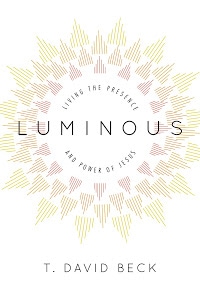By Cathy Norman Peterson
CHICAGO, IL (December 18, 2013) — Editors’ note: This month the Covenant Companion launches an online feature that highlights new releases by Covenant authors. These reviews will supplement those provided in the magazine and are available on both Covenant Newswire and the Companion website. Both books reviewed below are available for purchase at CovBooks.com.
“Works righteousness” is one of those overused phrases that serves as an easy shorthand for a complicated understanding. Adapted from a sermon by Martin Luther, the term can point to things we do as if they will earn us righteousness with God—which can include anything from feeding the homeless to attending a weekly Bible study. Of course our life with God involves much more than such important good works.
Two Covenant ministers have recently published books that address our deep need to engage life and ministry from the inside out.
 Luminous: Living the Presence and Power of Jesus by T. David Beck (InterVarsity Press, 2013)
Luminous: Living the Presence and Power of Jesus by T. David Beck (InterVarsity Press, 2013)
Before he traveled to Haiti on a mission trip, David Beck had something like a vision. In it he found himself on the edge of a scene with Jesus—and then wondered why he wasn’t at the center of the picture. Why wasn’t he with Jesus instead of off to the side watching?
Later when he was in Haiti and had an experience that directly mirrored the vision, Beck knew he needed to pay attention. It was at that moment that he realized his more than 30 years of following Jesus, eight years of studying theology, and nearly a decade of ministry were being distilled down to their essence, he writes in Luminous: Living the Presence and Power of Jesus.
We are called to the center of the Jesus-picture, he realized—to physically embody Christ’s presence and to love to the world around us, he explains.
Such an invitation may sound well and good, but Beck writes honestly about the challenges we face in such endeavors. We get stuck in our heads, becoming enamored with our pursuit of knowledge—even when it’s knowledge of God.
Or we get caught up in all our doing, focusing primarily on results we can measure. Beck cautions, “Our desire to be productive for Jesus can block our availability to be present with Jesus in a broken and needy world.”
Living with Jesus is not just about new experiences in the Christian life, Beck writes. Rather, it’s about allowing something to happen through us. Throughout the book he uses the theme of light to help readers identify aspects of that life that may have become dulled through time and overfamiliarity.
He focuses on four themes to explore how we might practice the incarnation story and thus shine the light of Christ. First, he asks, What is our purpose in life? And if God calls us with a purpose, how exactly do we become people of God’s purpose?
Second is practicing presence. Being present with God is a familiar invitation, but Beck recognizes the challenges of doing so, explicitly addressing our tendency toward “functional atheism,” a term coined by Parker Palmer to refer to how we might believe in God but live as if God didn’t exist. Other chapters in this section invite readers to be truly present in their bodies and with one another.
The theme of power can be fraught with landmines in the church, and Beck names our resistance to words like “surrender” and even “humility.” Finally he turns to peace, unpacking what the term shalom can mean for taking our place in the incarnation story.
Small groups will find this book great for discussion. Luminous is divided into nine chapters than can be easily read in one sitting. Engaging questions and discussion points are interspersed throughout each chapter.
Beck, who earned a doctorate in theology from Southern Methodist University, is pastor of Sanctuary Covenant Church in Sacramento, California. He also has taught seminary classes and serves on the board of directors for Child Hope International, a multifaceted mission in Port-au-Prince, Haiti.
 Just Spirituality: How Faith Practices Fuel Social Action by Mae Elise Cannon (InterVarsity Press, 2013)
Just Spirituality: How Faith Practices Fuel Social Action by Mae Elise Cannon (InterVarsity Press, 2013)
Mae Elise Cannon opens Just Spirituality: How Faith Practices Fuel Social Action by quoting Richard Foster’s critique of social activism, which he called “caring for social needs without reference to the condition of the heart.” Her aim is to address the core of his concern.
Cannon examines seven well-known figures who have “inspired powerful movements of compassion and justice around the world,” and how their personal faith affected their work with the poor and oppressed. She considers the lives of Mother Teresa, Dietrich Bonhoeffer, Watchman Nee (evangelist in China, 1903–1972), Martin Luther King Jr., Fairuz (a folk singer in Lebanon), Desmond Tutu, and Oscar Romero. Focusing on their spiritual lives rather than explicitly on their activism, Cannon integrates the practice of spiritual disciplines with God’s call to make disciples and respond to the needs of the world.
Each chapter pairs a contemporary activist with the historical, more well-known figure. Several of the contemporary names will be especially familiar to Covenanters, including Efrem Smith, Gary Burge, and Mark Labberton.
Cannon serves as the senior director of advocacy and outreach–Middle East for World Vision USA. Prior to joining World Vision, she served as a consultant on child advocacy issues for Compassion International. She is an adjunct professor at North Park Theological Seminary and a doctoral candidate in American history at the University of California–Davis. Her dissertation focuses on the history of the American Protestant church in Israel and Palestine.














